We have some nice info-graphics courtesy SaReGaMa (fun fact: RD was known as
Pa or Pancham). For those who do not know, RD Burman (and papa
SD Burman) were music directors connected to Bengal and Bombay.
If you
are not too snobbish about watching bollywood movies try Chalti Ka Naam
Gaadi (1958, music: SDB; assistant: RDB) and Golmal (1979, music: RDB). You will not
regret your time spent.
……………..
………………………
[ref. Wiki] Childhood: RD Burman was born on 27th June 1939 to Bollywood composer-singer Sachin Dev Burman and his lyricist wife Meera Dev Burman (née Dasgupta), in Calcutta.
Initially, he was nicknamed Tublu by his maternal grandmother although
he later became known by the nickname of Pancham.
…..
According to some
stories, he was nicknamed as Pancham because, as a child, whenever he cried, it sounded in the fifth note (Pa) of the Indian musical scale. The word Pancham means five (or fifth) in Bengali,
his mother’s native language, as well as the language of court of the
royal family to which his father belongs. Another theory says that the
baby was nicknamed Pancham because he could cry in five different notes.
Yet another version is that when the veteran Indian actor Ashok Kumar saw a newborn Rahul uttering the syllable Pa repeatedly, he nicknamed the boy Pancham.
…..
RD Burman received his early education at the St Xavier’s School in Kolkata. His father SD Burman was a noted music director in Bollywood, the Mumbai-based Hindi film industry. When he was nine years old, RD Burman composed his first song, Aye meri topi palat ke aa, which his father used in the film Funtoosh (1956). The tune of the song Sar jo tera chakraaye was also composed by him as a child; his father included it in the soundtrack of Guru Dutt’s Pyaasa (1957).
...
Early days: In Mumbai, RD Burman was trained by Ustad Ali Akbar Khan (sarod) and Samta Prasad (tabla). He also considered Salil Chowdhury as his guru. He served as an assistant to his father, and often played harmonica in his orchestras. Some of the notable films in which RD Burman is credited as the music assistant include Chalti Ka Naam Gaadi (1958), Kaagaz Ke Phool (1959), Tere Ghar Ke Samne (1963), Bandini (1963), Guide (1965) and Teen Devian (1965). RD Burman also played mouth organ for his father’s hit composition Hai Apna Dil to Aawara which was featured in the movie Solva Saal (1958).
…
In 1959, RD Burman signed up as a music director for the film Raaz, directed by Guru Dutt’s assistant Niranjan. However, the film was never completed. RD Burman’s first released film as an independent music director was Chhote Nawab (1961). When the noted Bollywood comedian Mehmood decided to produce Chhote Nawab,
he first approached RD Burman’s father Sachin Dev Burman for the music.
However, SD Burman turned down the offer, saying that he did not have
any free dates. At this meeting, Mehmood noticed Rahul playing tabla, and signed him up as the music director for Chhote Nawab. RD Burman later developed a close association with Mehmood, and did a cameo (apart from composing the music) in Mehmood’s Bhoot Bangla (1965).
Burman’s first hit movie as a film music director was Teesri Manzil (1966). Burman gave credit to lyricist Majrooh Sultanpuri for recommending him to Nasir Hussain, the producer and writer of the film. Vijay Anand also said that he had arranged a music session for Burman before Nasir Hussain. ….
Teesri Manzil had six songs, all of which were written by Majrooh Sultanpuri, and sung by Mohammed Rafi. Four of these were duets with Asha Bhosle,
whom Burman later married. Nasir Hussain went on to sign RD Burman and
lyricist Majrooh Sultanpuri for six of his films including Baharon Ke Sapne (1967), Pyar Ka Mausam (1969) and Yaadon Ki Baaraat (1973). Burman’s score for Padosan (1968) was well received. Meanwhile, he continued to work as his father’s assistant for movies like Jewel Thief (1967) and Prem Pujari (1970).
Glory Days: The superhit Kishore Kumar song Mere Sapnon ki Raani from Aradhana (1969), though credited to his father, is rumoured to have been RD Burman’s composition. Kora Kagaz tha Yeh Man Mera from the same film was also his tune.
It is believed that when SD Burman fell ill during the recording of the
film’s music, RD Burman took over and completed the music. He was
credited as an associate composer for the film.
…….
In the 1970s, RD Burman became highly popular with the Kishore Kumar songs in Rajesh Khanna-starrer movies. Kati Patang (1970), a musical hit, was the beginning of a series of the 1970s films directed by Shakti Samanta of Aradhana fame. Its songs Yeh Shaam Mastani and Yeh Jo Mohabbat Hai,
sung by Kishore Kumar, became instant hits. Apart from Kishore Kumar,
RD Burman also composed several of the popular songs sung by Mohammed Rafi, Asha Bhosle and Lata Mangeshkar.
…
In 1970, RD Burman composed the music for Dev Anand’s Hare Rama Hare Krishna (1971). The Asha Bhosle song Dum Maro Dum from this film proved to be a seminal rock number in the Hindi film music. The filmmaker Dev Anand did not include the complete version of Dum Maro Dum in the movie, because he was worried that the song would overshadow the film.
…
In the same year, RD Burman composed the music for Amar Prem. The Lata Mangeshkar song Raina Beeti Jaaye from this soundtrack is regarded as a classical music gem in Hindi film music.
……
The long night with a few stars: During the second half of the 1980s, RD Burman was overshadowed by Bappi Lahiri and other disco music composers. Many filmmakers stopped patronizing him, as films featuring his compositions flopped at the box office one after the other. Nasir Hussain, who had signed him up for every single of his productions since Teesri Manzil (1966), did not sign him up for Qayamat Se Qayamat Tak (1988).
….
In the year 1986, RD Burman composed the songs of Ijaazat: this score is regarded as one of his best scores. However, the film belong to the Parallel Cinema (art film) category, so it did not stop the decline of RD Burman’s commercial film career. All the four songs in Ijaazat
were sung by Asha Bhosle and written by Gulzar. RD Burman was greatly
appreciated by the critics for setting the non-rhyming lyrics of the
song Mera Kuchh Saamaan to the music.
While both Asha Bhosle (Best Female Playback) and Gulzar (Best Lyrics) received National Awards for the score, RD Burman received none.
….
RD Burman suffered from a heart attack in 1988, and in 1989, Burman underwent a heart bypass surgery at Princess Grace Hospital in London. During this period, he composed many tunes, which were never released. He composed music for Vidhu Vinod Chopra’s movie Parinda in 1989.
…..
Death 4 January 1994: Thenmavin Kombath, a Malayalam film by Priyadarshan was the last film he signed, but he died before he could score for the film. The music of 1942: A Love Story (1994) was released after his death, and was highly successful. It posthumously won him the third and last of his Filmfare Awards. As per Lata Mangeshkar he died too young & too unhappy.
………………….
regards
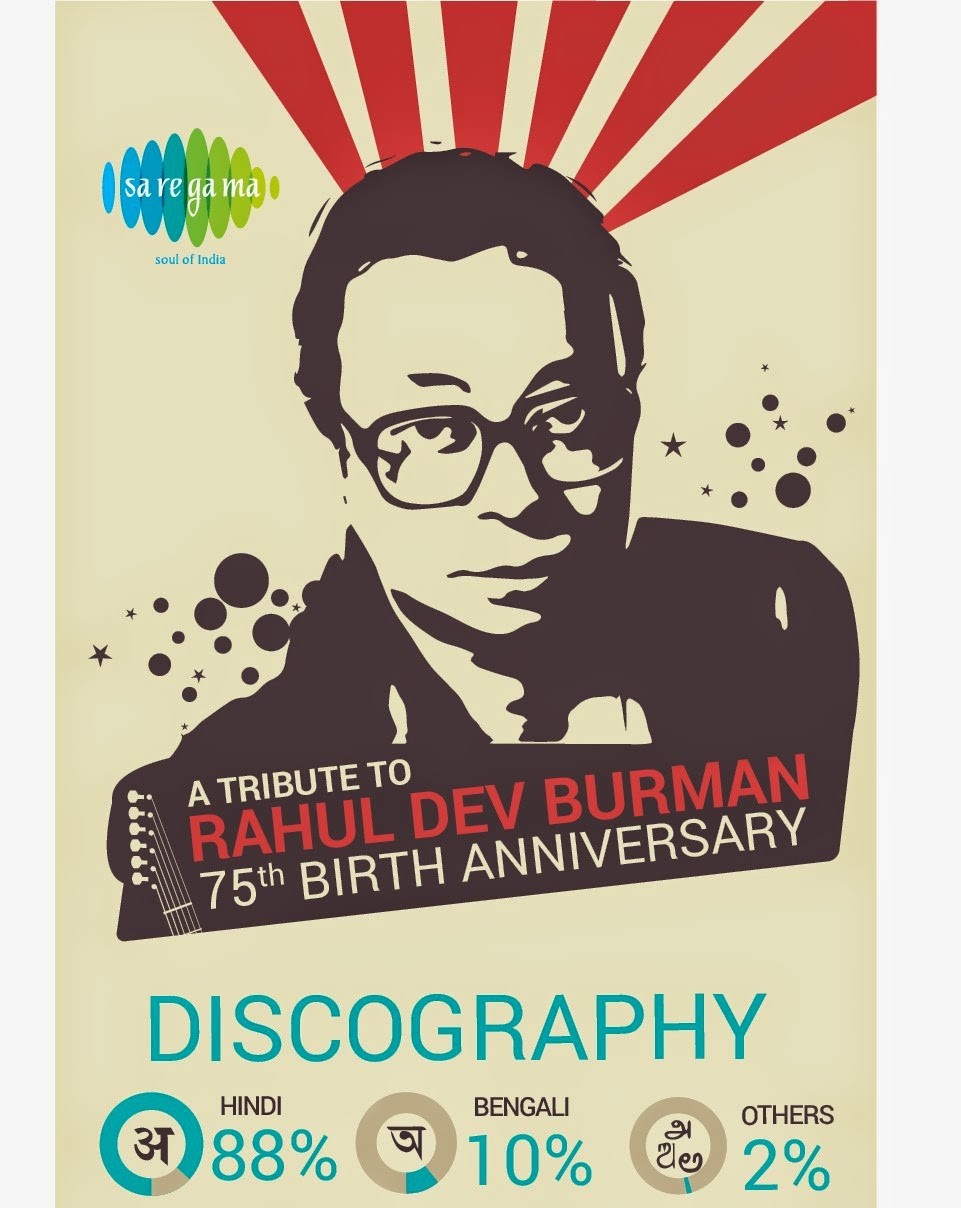
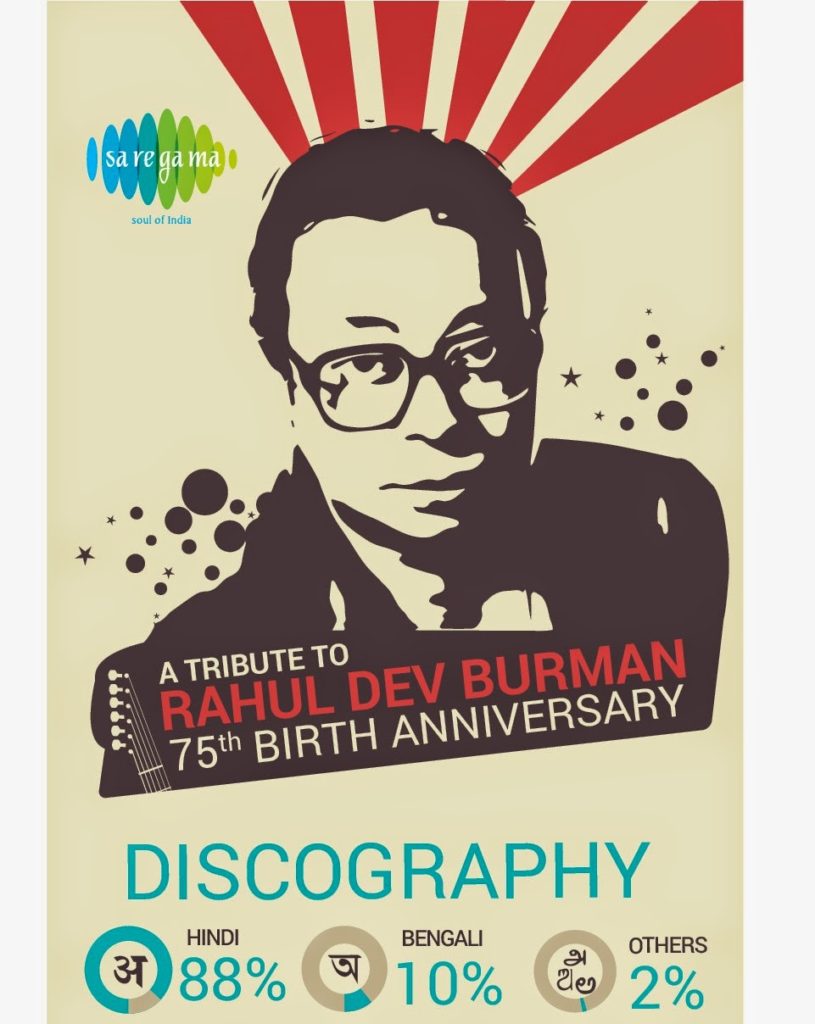
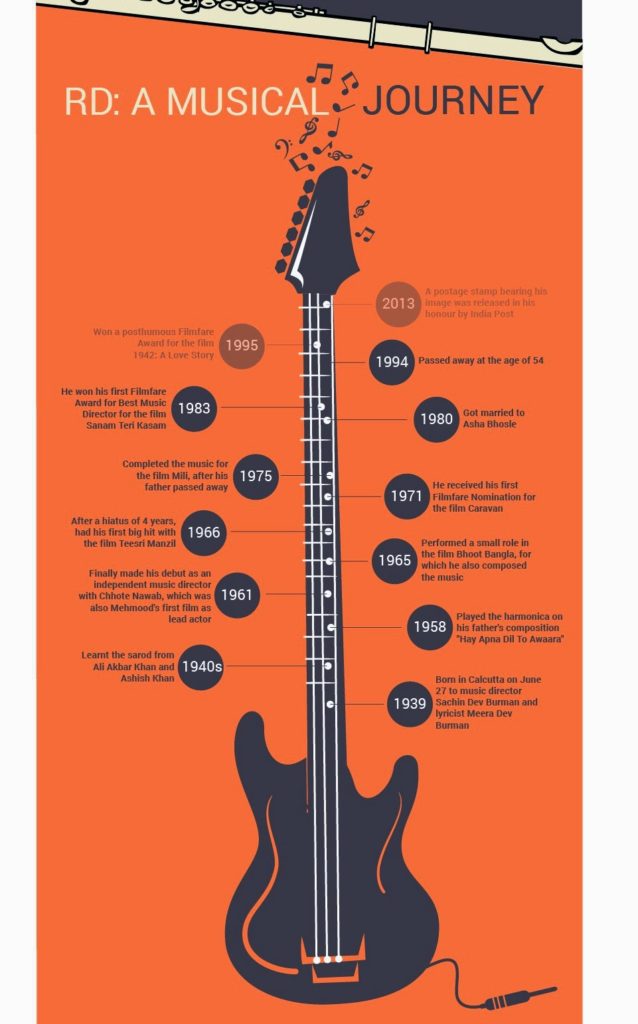
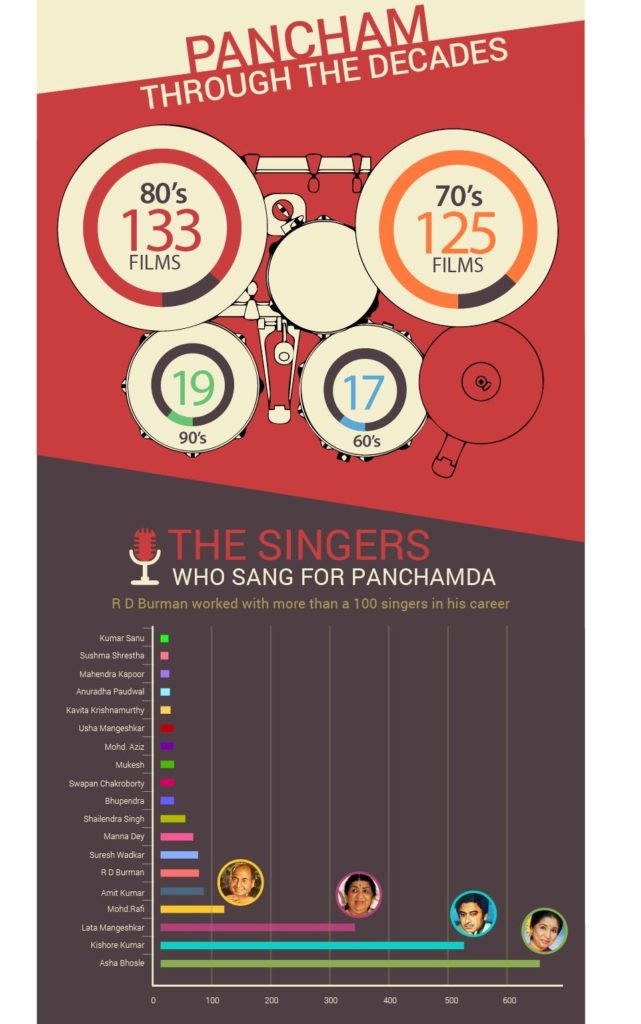
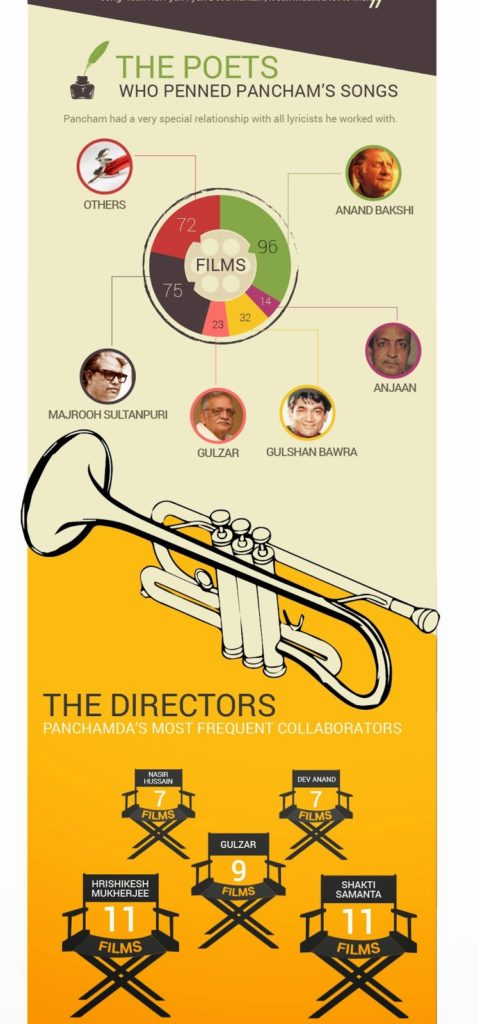
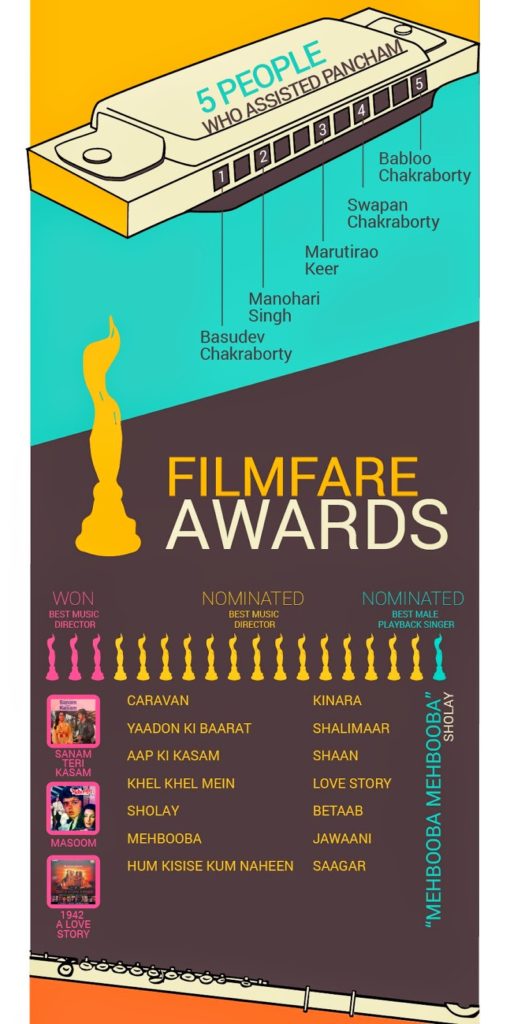
I love this page it says so much about RD Burman saab, he definatly deserved more awards.
He was the best his songs are heart touching.
Thanks for this was so good to know more about panchamda.
Real titan this guy.